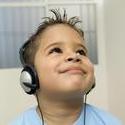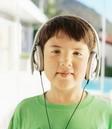|
| |
Hyperacute Hearing, Speech and Language Delay, Sensory
Processing Disorder and AIT
Testimonial by J. Stafford, Parent of 4 year old and 2 year old boys who
both did AIT
Millet, Alberta, Canada.
08-08-2001.
"I have confidence that Berard AIT
makes a beneficial difference in the way children perceive and process
sound and I hope that it will help others as much as it has helped my
boys...Prior
to Berard AIT, any new situation would have to be introduced very slowly
and you couldn't rush Adam or he'd fall apart. He doesn't say "what"
as much - in fact, he hears most of what we say the first time we say
it. Another unexpected effect of Berard AIT is Adam's motor planning is
suddenly better."
 "Adam
was born April
15, 1997.
He was my fourth child and my experience told me he was developing normally,
although he was a little slow at smiling. He had a few "peculiarities"
that we thought were merely personality quirks. He disliked
sudden sounds and certain, not unusually loud, sounds. As an infant
his father's sneeze always startled him so much he cried and this continued
past the time I thought he should be learning that this sound was not
something to be afraid of – I remembered how the older children were startled
by sneezes and they would jump but as time went on they got used to the
sudden sound; Adam never got used to it. "Adam
was born April
15, 1997.
He was my fourth child and my experience told me he was developing normally,
although he was a little slow at smiling. He had a few "peculiarities"
that we thought were merely personality quirks. He disliked
sudden sounds and certain, not unusually loud, sounds. As an infant
his father's sneeze always startled him so much he cried and this continued
past the time I thought he should be learning that this sound was not
something to be afraid of – I remembered how the older children were startled
by sneezes and they would jump but as time went on they got used to the
sudden sound; Adam never got used to it.
One
time when he was about six months old we entered a busy room with about
100 people talking in different conversations at one time. The
noise was just a buzz of conversation but Adam cried so inconsolably we
had to leave. As he grew older the sound sensitivity intensified
to the point that if he heard a diesel engine (bus or truck) he cried
and covered his ears. He refused to get out of
the car until all the trucks and busses on the street were past, but if
one came along while we were out of the car he ran away, crying, with
his hands over his ears. We are lucky that
we live in the country and his experience with trucks and busses was not
a daily ordeal.
He
hated the sound of trains, too. Adam’s grandparents
live on a farm in a valley and a train runs past their house. About
six miles from the farmhouse the train comes around the mountain and starts
its descent into the valley. If you listen closely and you have
good hearing you can hear it when it is about two miles away.
Adam would be playing in the yard when suddenly he’d start crying and
run into the house. It took a few years of this before I realized
that he could hear the train coming long before anyone else could hear
it and he had to escape the sound by going into the house.
By
the time Adam was 2 I realized he was delayed in speech and language development
and he started seeing a Speech-Language Pathologist at about the age of
two and a half. The Speech-Language Pathologist suggested
I consider Pervasive Developmental Delay as a possible “diagnosis” for
Adam. He would not easily imitate speech and getting him
to talk was very difficult. In November 2000, at the age three and
a half he was referred to the Glenrose Children's
Rehabilitation
Hospital
in Edmonton,
Alberta,
for testing.
Tests
revealed that Adam had a severe fine motor skill delay and moderate speech/language
and gross motor skill delays. No diagnosis was made but
I was told to read literature on Nonverbal Learning Disability (NVLD).
Adam was placed in a PUF program (an Alberta Education program
for preschool children) and he worked with a speech-language pathologist,
occupational therapist and physical therapist in the winter/spring of
2001. He attended a Head Start Preschool
and he was noticeably less sociable than many of the other children.
He had a lot of trouble with transitions – not understanding when
it was time for story time or outside time. Changes in
routine bothered him a lot. One day the class was having their photographs
taken by a professional photographer. We arrived late for class,
which was a mistake on my part. Since we had to “hurry” to get into
the room he was upset to begin with and when it was time for him to get
his picture taken he had a temper tantrum. He wouldn't’ even sit
on my lap and have his picture taken with me.
Life was like
this always for Adam – very upsetting, full of changes that bothered him,
and noises.
In
April 2001, just before his fourth birthday, I took Adam to see a National
Academy of Child Development (NACD) examiner in
Michigan.
The NACD examiner did not give a diagnosis but after assessing Adam she
prescribed an individual program. From them I learned that Adam
would probably benefit from some sort of "Listening Program."
NACD inadvertently pointed me in the direction of Sensory Integration
Dysfunction (SID) as a possible diagnosis for Adam. This
diagnosis seems to fit very well, much better than Pervasive Developmental
Disorder and Nonverbal Learning Disorder.
In
May 2001 Adam and I came out of
a hospital as a helicopter was coming in to land on the roof. The
helicopter was loud, I’ll admit, but not unbearable to me. Adam
went absolutely crazy. He covered his ears and started screaming.
I’ll never forget the panic on his face as he ran, looking up in the sky
trying to find the noise and ran straight into the street.
IF there had been traffic on the street he would have been hit.
I couldn't’catch him and he was in no condition to listen to me.
This event scared me a lot and I realized just how serious his sound sensitivity
was. I decided I had to find a "Listening Program" for
Adam.
As I read more about Berard
AIT I decided to take my youngest son as well. Benjamin was
born October 16, 1998 and was doing well except for a speech delay.
He was nearly three years old and could only say the first consonant
of any word. So, "B" could mean ‘blanket,’ ‘bottle,’ ‘brush,’
‘boot,’ ‘big,’ ‘blue’… without context we could not understand him
at all. He had had six ear infections in the winter of 2000/2001.
Whether or not this is the reason for the delay we will never know.
But since Berard AIT has
been credited with helping children with speech delays and history of
ear infections I decided to take him with us if and when we found an Auditory
Integration Training Practitioner.
In
August 2001 I took my two small sons, Adam, 4, and Benjamin, 2, to do
the ten-day session of Berard AIT.
The results were immediate and noticeable. After about the
third day of auditory training Adam heard a diesel truck on the street.
He sat with his hands poised over his ears and he said, "where's
the truck?" but he didn't cover his ears and he did not cry.
My
son Adam After Berard AIT:
-
Since
then he has not cried and tried to escape the sound when he hears
a diesel engine. Our trips to town are SO MUCH happier.
He actually likes big trucks now. He is also much more
sociable. While we were in Calgary
for the AIT we went to
a playground and when a little boy arrived Adam called out to him,
"Hey, what's your name?" and he ran over to play with the
boy. They played for 1/2 hour, chasing each other around and
playing with toys. This was a very new behavior for Adam.
His ability to withstand change (transitions) is much, much better.
-
Prior to
AIT any
new situation would have to be introduced very slowly and you couldn't
rush Adam or he'd fall apart. He doesn't say "what" as much
- in fact he hears most of what we say the first time we say it.
Another unexpected effect of
AIT is Adam's motor planning is suddenly better.
He can run and kick a ball, and use a hockey stick much more adeptly
than he could before. He is also much happier. He used
to cry a lot.
-
In
the fall of 2001 Adam entered Kindergarten. He was only
four years old but since he had fine motor skill and speech/language
delays he was able to enter school with a full-time aide. For
the entire school year he worked twice a month with a speech therapist
and occupational therapist. At the end of the year Adam
had made such gains that he did not qualify for an aide for the next
year. He had only a mild fine motor skill delay
now (or less) and his speech/language abilities were even better.
He fit in well with his classmates and made friends. I started
his in skating that fall (a month after finishing
AIT) and my two teenage daughters who knew Adam’s personality
quite well said, “Good luck” when I started taking him. He surprised
us all by his cheerful attitude toward learning something very hard!!!
He is now, in my opinion, a good hockey player (for a six-year-old!)
-
Adam
is now halfway through First Grade and is reading quite well.
He is doing fine in Math – he is slow to do the work, but it
is accurate. He has lots of friends. He has trouble
with organization (his desk is a mess), which is probably part of
his undiagnosed learning disability. Berard
AIT has not been able to cure him of everything,
but I KNOW it has helped to make his life a much happier, productive
one. I thank God I kept searching and reading – about learning
disabilities and therapies – because if I had just sat back and accepted
everything I don’t know where we’d be.
My
son Ben After Berard AIT:
-
The
changes AIT wrought for
Ben have been as great.
Before Auditory
Training Benjamin called Adam "Ah". During
the Auditory Training he started calling Adam "Ada."
Four months later he could say the full name. Two weeks after
Auditory Training the speech-language pathologist assessed Benjamin
with a severe speech delay and then we started seeing her weekly.
After six weeks she said he'd made such improvement that she didn't
need to see him again for three months and that he was probably already
down to a moderate delay. She didn't retest him because
she can only test a child once a year - the child learns the test
and scores better because he knows the test, not because he is speaking
any better. Benjamin is also sleeping much better.
-
Before
AIT he woke at 3 a.m.
a few nights in a row at least every two months - he was ready to
stay up and play.
Since
AIT he has slept well every single night.
-
Ben’s
balance is also much better.
Most of his walking life he had at least
one bruise on his forehead from a fall. This change occurred
shortly after we finished
AIT. Whenever Ben ran he fell - I just got into the habit
of saying, as he started to run, “Be careful,” because he invariably
would trip and hurt himself.
One day about five months after
AIT I found myself saying
to him, as he was trotting along on the sidewalk, “Be careful” and
I realized he hadn't fallen in months! Ben is now in Kindergarten
and reading almost as well as Adam.
| |
|






